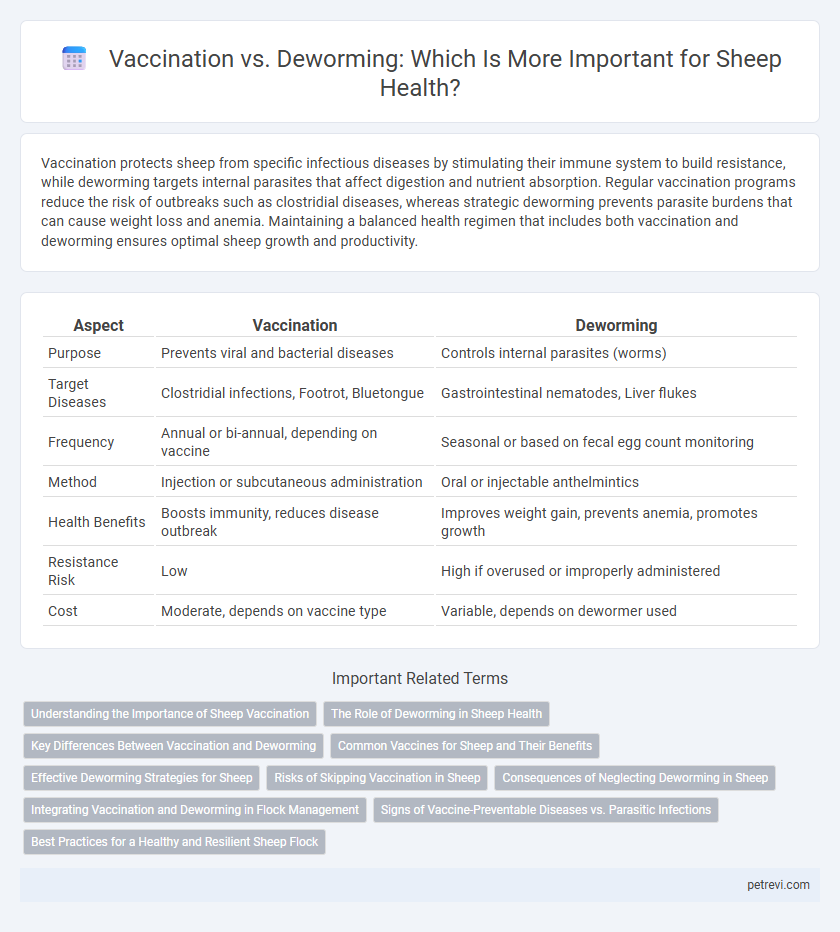Vaccination protects sheep from specific infectious diseases by stimulating their immune system to build resistance, while deworming targets internal parasites that affect digestion and nutrient absorption. Regular vaccination programs reduce the risk of outbreaks such as clostridial diseases, whereas strategic deworming prevents parasite burdens that can cause weight loss and anemia. Maintaining a balanced health regimen that includes both vaccination and deworming ensures optimal sheep growth and productivity.
Table of Comparison
| Aspect | Vaccination | Deworming |
|---|---|---|
| Purpose | Prevents viral and bacterial diseases | Controls internal parasites (worms) |
| Target Diseases | Clostridial infections, Footrot, Bluetongue | Gastrointestinal nematodes, Liver flukes |
| Frequency | Annual or bi-annual, depending on vaccine | Seasonal or based on fecal egg count monitoring |
| Method | Injection or subcutaneous administration | Oral or injectable anthelmintics |
| Health Benefits | Boosts immunity, reduces disease outbreak | Improves weight gain, prevents anemia, promotes growth |
| Resistance Risk | Low | High if overused or improperly administered |
| Cost | Moderate, depends on vaccine type | Variable, depends on dewormer used |
Understanding the Importance of Sheep Vaccination
Sheep vaccination is crucial for preventing infectious diseases such as clostridial infections and footrot, which significantly impact flock productivity and welfare. Vaccines stimulate the sheep's immune system to build resistance, reducing the severity and spread of harmful pathogens within the herd. Effective vaccination programs, combined with strategic deworming, optimize overall sheep health by targeting both infectious diseases and parasitic infestations.
The Role of Deworming in Sheep Health
Deworming plays a critical role in maintaining sheep health by controlling internal parasites like gastrointestinal nematodes, which can cause weight loss, anemia, and decreased wool quality. Regular strategic deworming improves nutrient absorption and overall productivity, reducing mortality rates and enhancing growth performance. Effective parasite management through deworming complements vaccination programs by minimizing disease susceptibility caused by parasitic stress.
Key Differences Between Vaccination and Deworming
Vaccination in sheep primarily targets specific infectious diseases by stimulating the immune system to build long-lasting immunity, while deworming focuses on controlling internal parasites such as gastrointestinal nematodes through anthelmintic treatments. Vaccines prevent viral and bacterial illnesses like clostridial diseases, whereas dewormers reduce worm burdens to improve nutrient absorption and overall health. Timing and frequency also differ: vaccinations are typically administered at set intervals for sustained protection, whereas deworming schedules depend on parasite load and pasture contamination levels.
Common Vaccines for Sheep and Their Benefits
Common vaccines for sheep include those protecting against clostridial diseases such as tetanus and enterotoxemia, which significantly reduce mortality rates. Vaccination enhances immune response, preventing outbreaks of contagious diseases and improving flock productivity. Deworming targets internal parasites but does not replace vaccines, making both practices vital for comprehensive sheep health management.
Effective Deworming Strategies for Sheep
Effective deworming strategies for sheep include regular fecal egg count monitoring to determine parasite load and tailor treatments accordingly, reducing the risk of anthelmintic resistance. Utilizing targeted selective treatment (TST) ensures only heavily infected individuals receive medication, preserving susceptible parasite populations and enhancing long-term control. Rotational grazing combined with strategic deworming timing optimizes parasite reduction by interrupting life cycles and minimizing pasture contamination.
Risks of Skipping Vaccination in Sheep
Skipping vaccination in sheep significantly increases the risk of outbreaks of infectious diseases such as clostridial infections and footrot, leading to high morbidity and mortality rates within flocks. Unvaccinated sheep are more susceptible to contagious pathogens, resulting in costly treatment, decreased wool and meat production, and potential zoonotic transmission. Regular vaccination programs enhance herd immunity, reducing the need for frequent deworming and minimizing the overall health risks associated with parasitic and viral infections.
Consequences of Neglecting Deworming in Sheep
Neglecting deworming in sheep leads to severe parasitic infestations causing weight loss, reduced wool quality, and compromised immune function. Gastrointestinal nematodes such as Haemonchus contortus cause anemia, diarrhea, and increased mortality rates, directly impacting flock productivity. Failure to control internal parasites results in increased veterinary costs and diminished overall flock health, undermining the effectiveness of vaccination programs.
Integrating Vaccination and Deworming in Flock Management
Integrating vaccination and deworming in flock management enhances sheep health by simultaneously preventing infectious diseases and controlling parasitic infestations. Strategic scheduling of vaccines against clostridial diseases alongside targeted deworming protocols reduces morbidity, boosts immunity, and improves overall productivity. Utilizing veterinary guidance and diagnostic tools ensures effective timing and selection of vaccines and anthelmintics tailored to flock-specific disease and parasite challenges.
Signs of Vaccine-Preventable Diseases vs. Parasitic Infections
Signs of vaccine-preventable diseases in sheep often include fever, lethargy, respiratory distress, and sudden death, which indicate infections like clostridial diseases and contagious ecthyma. Parasitic infections manifest through weight loss, anemia, diarrhea, and wool loss, commonly caused by gastrointestinal nematodes and liver flukes. Effective health management requires distinguishing these symptoms to apply targeted vaccination or deworming protocols and maintain flock productivity.
Best Practices for a Healthy and Resilient Sheep Flock
Effective vaccination protocols target common sheep diseases such as clostridial infections, footrot, and pneumonia, enhancing the flock's immunity and reducing mortality rates. Deworming strategies should be based on fecal egg counts to minimize resistance and focus on strategic deworming periods, particularly before lambing and after pasture rotation. Combining evidence-based vaccination and targeted deworming ensures optimal flock health, growth performance, and long-term resilience against parasites and infectious diseases.
Vaccination vs Deworming for Sheep Health Infographic

 petrevi.com
petrevi.com